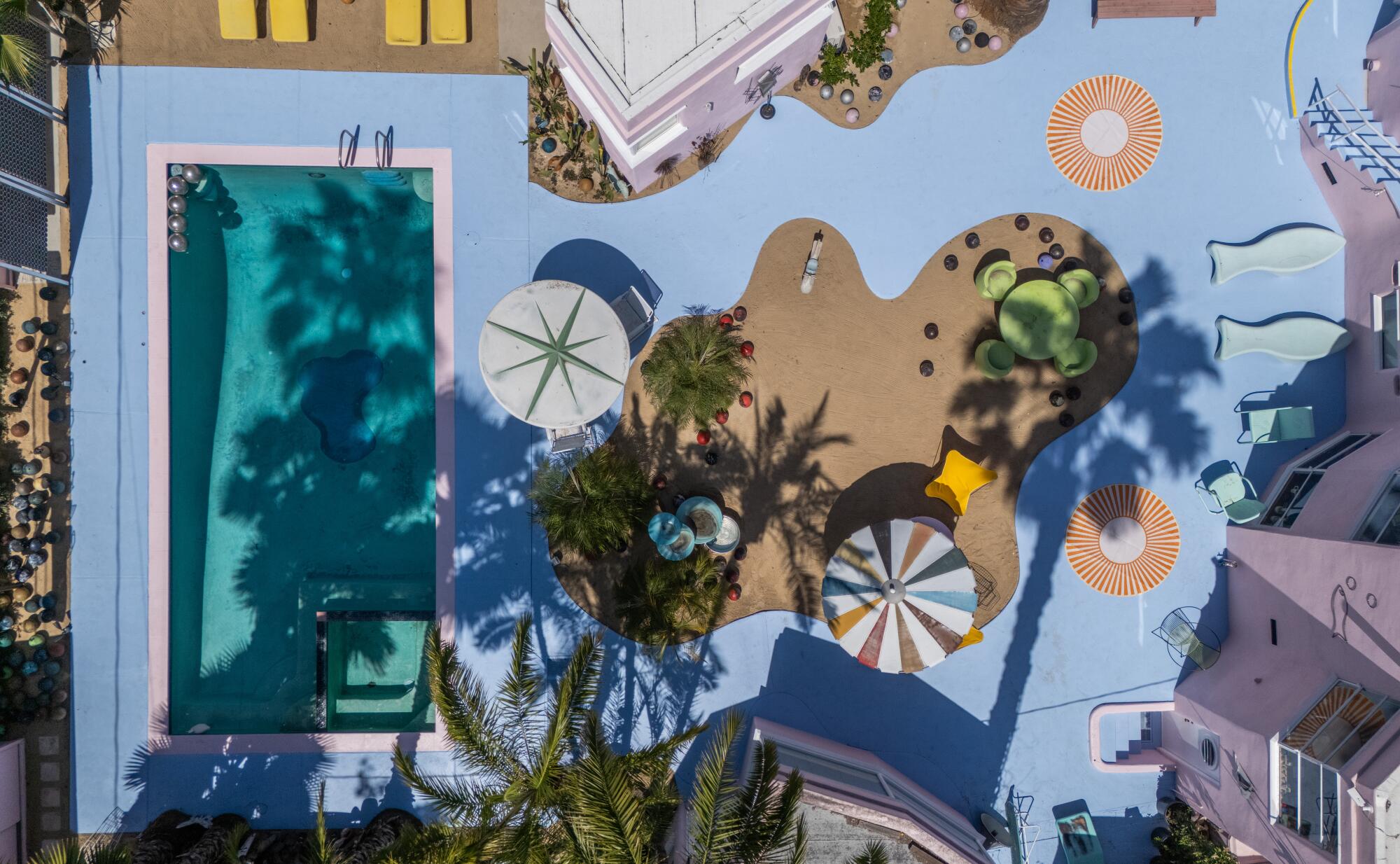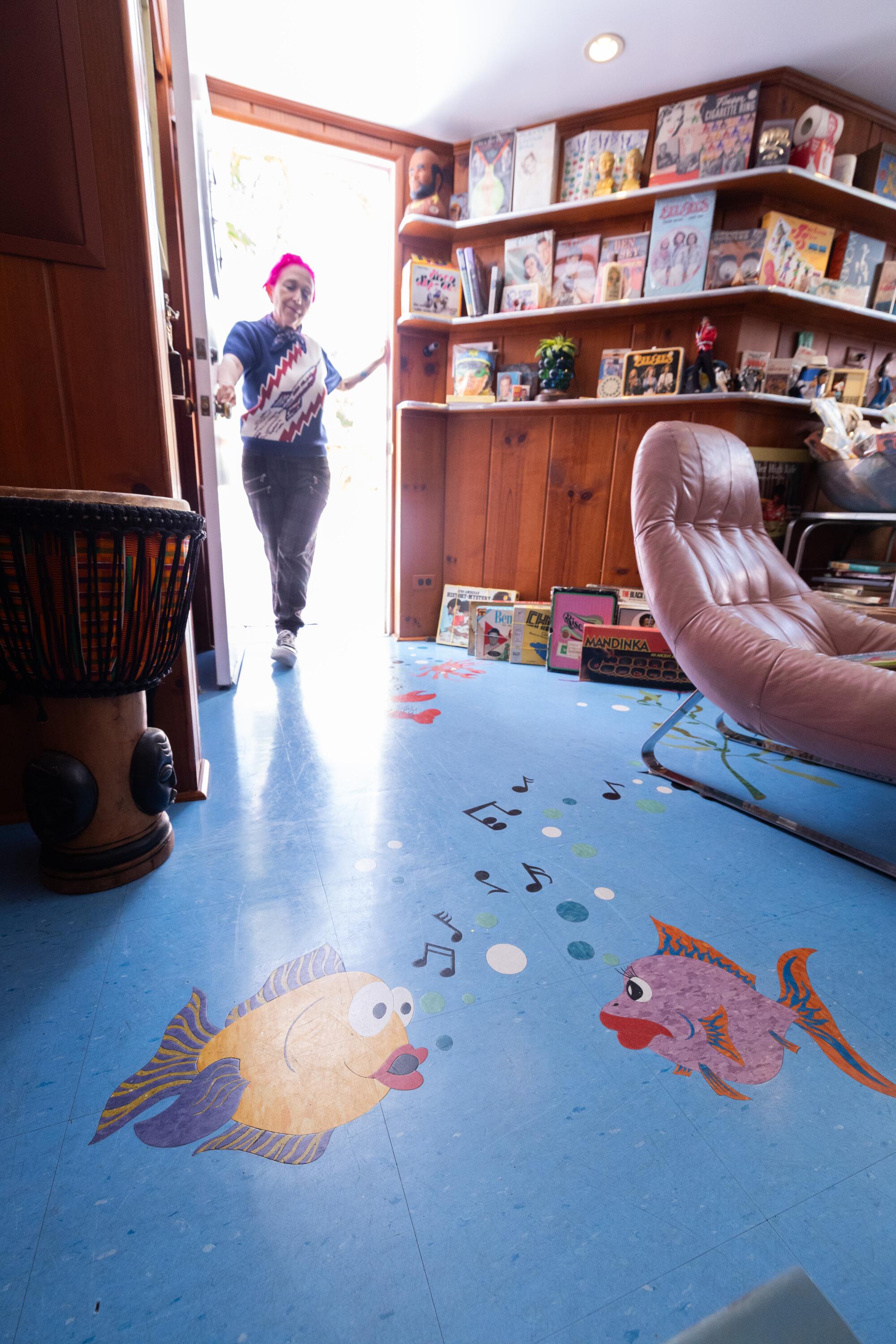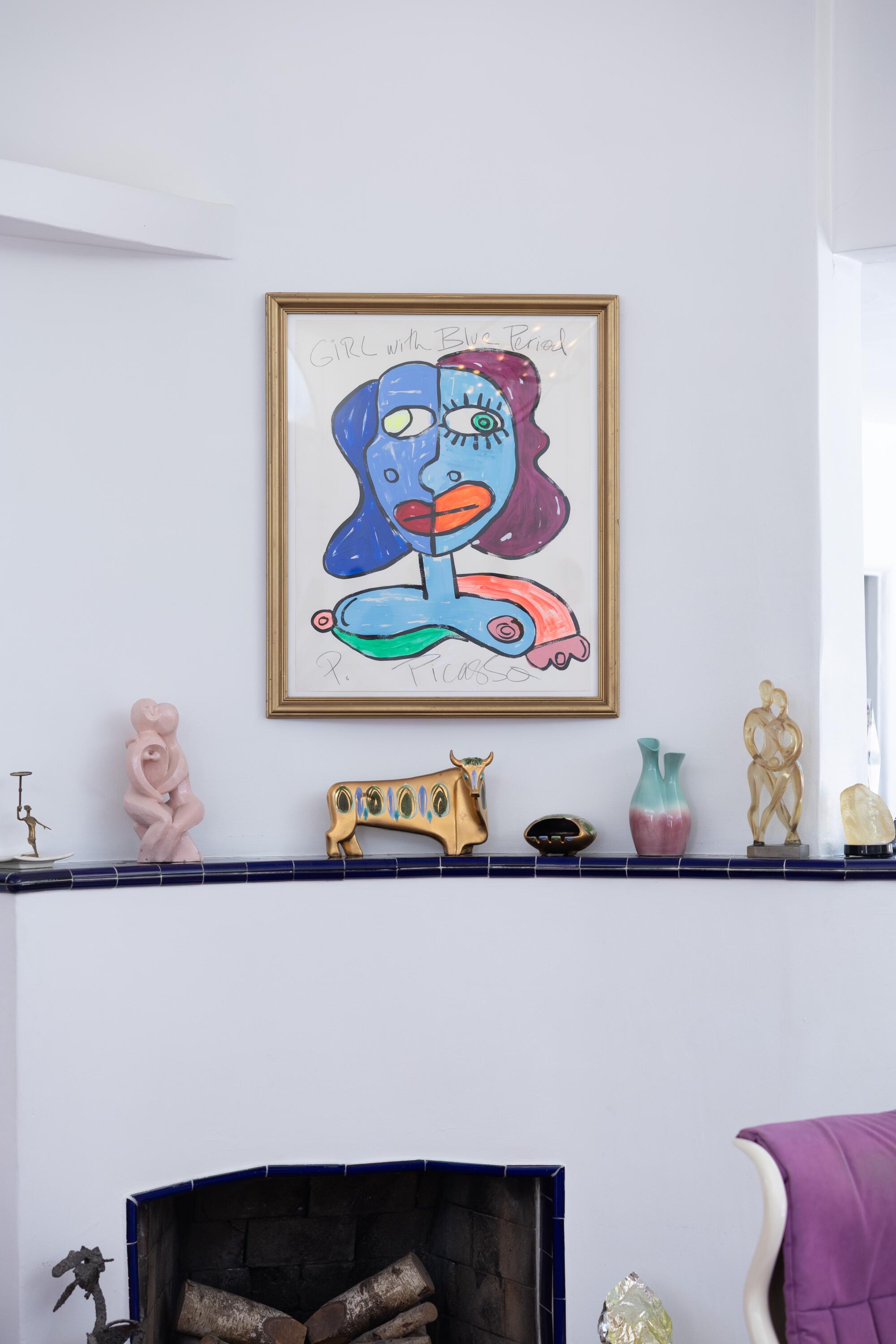
- Share via
- Famed songwriter Allee Willis, who died in 2019, was known for her talent, playfulness and kitschy fever dream of a home.
- Now her home, dubbed Willis Wonderland, has been reimagined as a pop-up book so anyone can see inside.
- Her whimsical home decor currently remains, but what may happen next to Willis Wonderland is up in the air.
When you walk into Willis Wonderland, your eye doesn’t know where to land. The North Hollywood house, which songwriter Allee Willis first purchased in 1980 and turned into a living ode to all things kitsch, is awash in trinkets and tchotchkes. But also in coveted art pieces and stylish furnishings.
The living room alone features a lavender Plycraft chair and a Sputnik chandelier as well as a Weltron Space Ball Retro stereo boasting an Earth, Wind & Fire 8-Track and a “Sock It To Me” squished beer ashtray. It’s all just the way Willis had it before she died in 2019 at 72.

And now, for those who have always wished they could tour this most fabulous of L.A. houses where everyone from Lily Tomlin, Paul Reubens and Cassandra Peterson once partied, comes a new pop-up book that brings it into your own, likely less fantastical, home.
“Willis Wonderland: The Legendary House of Atomic Kitsch” was written by Willis’ friend Hillary Carlip and Trudi Roth, designed by Carlip, illustrated by Neal McCullough and paper-engineered by Mike Malkovas. And, like the house it hopes to capture and mythologize in equal measure, the pop-up book is a celebration of Willis’ own “more is more” sensibility.
Dani Dazey made a name for herself designing the Trixie Motel in Palm Springs. Now she’s created her dream home in L.A., every inch covered in wallpaper, color and patterned textiles.
“When you walk in, it’s full of surprises,” Carlip tells me as we walk around the house on a sunny Friday morning and admire the Jason Mecier portrait of Willis made of trash trinkets. “You keep finding new things. I’ve been here hundreds of times, and I saw something today I hadn’t seen before. I wanted to do that with the pop-up book. To have easter eggs and things where you pull and spin and open and that kind of thing. I just think the interactivity, where you really immerse yourself in it, is really important now, especially since so much is digital.”

The tactility of the book encourages you to explore every nook and cranny of the house, which does already feel like a museum of sorts. Of kitsch, perhaps, but also of Willis herself. The more you get to learn both about this well-kept building (once rumored to be an MGM party house), you also learn more about Willis’ extraordinary career.
Willis is perhaps best known as the songwriter behind such hits as Earth, Wind & Fire’s “September” and “Boogie Wonderland.” But over her four-decade career, she also co-wrote the songs for Broadway musical “The Color Purple”; penned a Grammy-winning tune for “Beverly Hills Cop”; and worked with acts as varied as the Pet Shop Boys, Dusty Springfield, Patti LaBelle, Cyndi Lauper and Taylor Dayne.
But she was also a visual artist, a designer, a sculptor and an avid collector. With her signature asymmetrical haircut, her loud, fashionable outfits and a penchant for all things off-kilter, the Detroit-born artist made little distinction between her work and her life. It makes sense her abode, a pink William Kesling single-family house (one of only 15 built in the Los Angeles area in the 1930s) dotted with bowling balls and palm trees, would serve as a continuation of her wild, wondrous aesthetic.


When Willis died, the question of what to do with her Willis Wonderland was entangled with how to further cement her legacy. Her partner, animator and producer Prudence Fenton, knew the famed house would need to be cared for. And, perhaps more importantly, memorialized.
When Fenton and Vincent Beggs — the executive director of the Willis Wonderland Foundation, launched in 2022 — came up with the idea of a book about the house, they knew it couldn’t be just any kind of book. They toyed with a sleek coffee table book with gorgeous photos of the house. But that would’ve been too sterile. Too staid. Willis, they knew, deserved something bolder.
Before installing a kitchen in a tiny ADU, homeowners should assess its purpose, measure it carefully, research small-scale appliances and imagine it as a full-size kitchen.
The pop-up book offers as immersive a tour of the house as you can dream of. The scene at the so-called “kitsch-en,” for instance, wonderfully captures Willis’ commitment to playfulness as a central design conceit — something all too rare in a world often dressed in basic neutrals.


A pink-leather dinette anchors a space that’s all but drowning in tiki mugs, salt and pepper shakers and adorned with artworks (including a collection of Zel caricatures). Willis’ humor is clearly prevalent throughout.
That’s nowhere more obvious than in her “Rec Room.” A blue-hued linoleum floor made to look like an aquarium, replete with singing fish and turtles, brightens the dark-wooded downstairs space and echoes the nautical elements Kesling introduced into his Streamline Moderne homes. Here, this underwater space serves as a repository for “Allee’s Legendary Landfill of Esthetic Essentials.”


The shelves, as the book shows, are filled to the brim with collectibles, many of them part of the collection of Black culture, which her friend James Brown first helped her curate. Lunchboxes, magazines, records, action figures and sculptures all but beg you to spend hours upon hours examining each and every one of them. This is thrifting as cultural history. Kitsch as historical remembrance.
In Carlip’s pop-up version of this room, you can see, among many other things, a crowned Miss America Vanessa Williams Corn Flakes box, a slew of Afro picks ready for the taking, a Harlem Globetrotters coloring book, a Diana Ross doll and a Chubby Checker Twister game.
“It’s a funny thing, because Mike, the paper engineer, who’s done many other books and clients and everything, kept saying, ‘You can’t have so much detail. You have to edit,’” Carlip shares. “And I was like, ‘Nope.’ I just stood my ground. I was like, ‘It’s Allee. It’s all got to be in there.’ But then I finally relented and said, ‘How about there’s a downloadable poster where people can get descriptions of items and see them up close?’”
In that poster, you can see “Libby the Lovely Liberated Lady” doll, a Women’s Liberation toy that’s as hilarious as she sounds (you’re encouraged to pull her skirt for a surprise). And you can also see a photo of the famed Riverside Market sign that adorns the house’s outdoor pool next to a portable bar Willis had hand-sculpted from Motor City-found items.
As the future of the house as it stands remains up in the air, with Carlip unsure what the Foundation has planned for it, the pop-up book (like last year’s “The World According To Allee Willis” documentary) hopes to make sure Willis’ artistry is preserved in ways she would most enjoy.

“I just think it really captures her whimsy, her thoughtfulness, her creativity and the joy,” Carlip adds, about the house and book alike. “Everything she created had so much joy in it. I think when people come into this house, they feel all those things, they’re inspired to create. I think just the breadth of her creativity is infectious. You cannot help but be inspired by being in here.”
Carlip points to a painting that sits atop the fireplace right above a Sascha Brastoff gold ceramic bull. The piece features a blue-hued woman whose irregular features (bold neon lips, perky colorful nipples) are intentionally meant to evoke a certain famed artist. It is signed “P. Picasso.”
“People would always ask her, ‘Is this …?’” Carlip recalls with a laugh. “It’s not. I mean, it’s called ‘Girl with Blue Period.’”
More to Read
Sign up for The Wild
We’ll help you find the best places to hike, bike and run, as well as the perfect silent spots for meditation and yoga.
You may occasionally receive promotional content from the Los Angeles Times.













